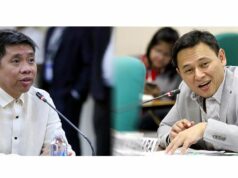Party-list to challenge proposed full foreign ownership of RE projects
THE Bayan Muna Party-list said it will challenge a proposal allowing full foreign ownership of renewable energy (RE) projects.
Bayan Muna called the plan unconstitutional.
On Friday, Energy Secretary Alfonso G. Cusi said his department is backing a policy allowing 100% foreign ownership in renewable power firms, which it positioned as an energy-security measure.
“I’m looking at allowing 100% (foreign) ownership in renewables… Lahat naman halos ng technologies ng renewable ay foreign-sourced (Most of our energy technologies are foreign-sourced),” Mr, Cusi said at a webinar hosted by the Philippine Energy Independence Council.
Bayan Muna Rep. Carlos Isagani T. Zarate said in a statement: “This proposal flagrantly violates the citizenship limitations in the national economy and patrimony provisions of our Constitution. The degree by which the officials of the Duterte administration are selling our country to foreign interests is truly appalling and gravely condemnable.”
“Aside from constitutional issues, this proposal has security implications also because foreigners can control our power grid and can even… threaten or hold hostage our economy,” he added.
The Constitution only allows foreign entities to own up to 40% of the capital stock of a public utility.
In March, the House of Representatives passed a bill amending the Public Service Act. It seeks to limit the classification of a public utility to electricity distribution, power transmission, and water pipeline distribution or sewerage systems. The measure also left out the 60-40 rule on foreign ownership.
Mr. Cusi said the Department of Energy (DoE) is “really brainstorming” the proposed policy, saying that he will seek the help of the Joint Congressional Energy Committee “to help expedite that, para mapabilis ang development ng renewables sa ating bansa (to hasten renewables development).”
Sustainability think-tank Center for Energy, Ecology, and Development (CEED) said the government cannot surrender the generating industry to foreigners.
“Remember, the government already surrendered our grid to foreigners instead of handling it themselves. They cannot surrender our gencos (generation companies) as well,” CEED Executive Director Gerard C. Arances said, referring to the private National Grid Corp. of the Philippines (NGCP), which is 40% owned by the State Grid Corp., of China.
“I personally believe that we should really open that to foreigners dahil ‘yung investment naman nila, ‘di naman nila madadala ‘yan. ‘Yung resource naman natin, ‘di naman nila maiuuwi ‘yan sa kanila,” he claimed. (Whatever foreigners invest in, they cannot take home with them. The resource remains ours.)
The DoE has called for a unified approach by the government and the private sector to attain energy security and independence. It called for a balance in meeting energy needs and achieving sustainability goals through renewables.
“There is a need to strike a balance between meeting our current energy needs and building a better and cleaner world for the coming generations. Reality makes us realize that we cannot sacrifice one in favor of the other,” Mr. Cusi said.
Meanwhile, the power generation industry said it will participate in any future consultation on the proposed measure, though it does not have a position on the matter.
The Philippine Independent Power Producers Association (PIPPA) said the industry is currently pressing for policies that will strengthen the electricity spot market to encourage more competition.
“With the COVID-19 (coronavirus disease 2019) situation, we look forward to policies and regulations concerning a reserve or co-optimized market, RE (renewable energy) market, and futures market where our players can fully explore a competitive energy industry,” PIPPA Executive Director Anne E. Montelibano said. — Adam J. Ang



